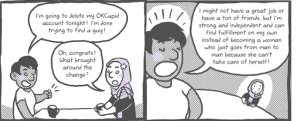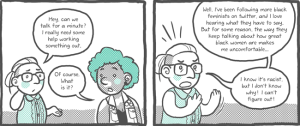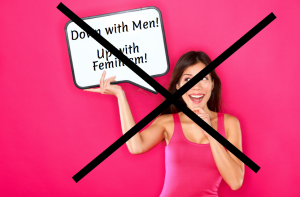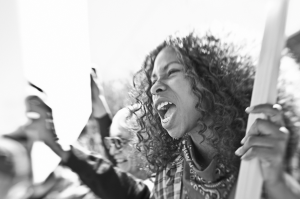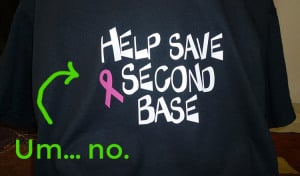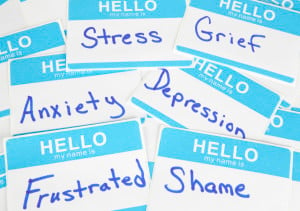
Woman sitting in front of the computer.
Call outs can be too punishing in nature, creating an oppressive culture marred by a fear of making missteps.
According to many critics, modern activism is increasingly becoming a space devoid of vigorous discussion or differences of opinion. They have a point.
Oftentimes, those characterizing call out culture as silencing and toxic just don’t want to perform the necessary emotional labor to change. They would rather ignore or reinforce their own privilege within activist spaces and on social media.
“Saying that activists are choking on ‘call out culture’ remains a very, very convenient argument for people who don’t want to take responsibility for their words, especially in the upper echelons of academia and the press,” said academic and social critic Katherine Cross.
Call out culture has very real and legitimate harmful downsides that can result in people losing entire careers or get majorly doxxed and harassed.
While this is true, it’s also important to note that call outs are strong and remarkably effective tools for enacting social change because they apply public pressure and are shareable, allowing them to easily hit critical mass.
While call outs themselves can have a lot of power, it’s important to understand how to use them responsibly to solve problems while avoiding toxicity.
Here are three key points to keep in mind to ensure your next call out is successful:
1. Repeat call outs of smaller concepts
Calling out smaller, more personal harm in a way that explains larger systemic issues can lead to individual breakthroughs.
One example of a successful call out was when activist and writer Giselle Ah Nhien Nguyen got an email from a friend thanking her for calling her out on telling harmful rape jokes.
The friend explained that it took a while to work through the criticism but now sees the harm in such jokes and how it wasn’t good enough to just say he opposes rape — his actions needed to match his words.
Responses to call outs like this are exceedingly rare and, generally, those partaking in call out culture could use a massive amount of self-reflection and awareness on an everyday basis.
“Personal interactions can make a difference, and staying silent in the face of prejudice solely for fear of social retribution is complicity,” Nguyen said. “In every 100 instances of being called a sanctimonious feminazi bitch, there might be one like this.”
Despite the fact that call outs do end up working in the long run, many people criticize the performative nature of call out culture, insisting that activists would rather make a show of their “wokeness” than do actual work to solve “real problems.”
2. Think Less Performance, And More Education
Call outs that feel less like showing off how “woke” you are and more like you’re trying to teach others will have a more direct impact.
For all the criticism of performative call out culture, call outs remain primarily an educational tool for third parties, though it doesn’t feel that way to those who are directly called out for seemingly innocuous transgressions.
“While call-outs may certainly boost a smug sense of moral superiority for some, they, more importantly, allow the oppressed to protect themselves from everyday language, actions, and micro aggressions that threaten their safety, and hopefully influence a trickle-down shift in societal thinking,” Nguyen said.
3. Stick To The Historical Roots Of Call Out Culture
If call outs are to remain an effective tool, it’s important that critics understand the original purpose of call outs, especially accounting for how social media has become integral to modern activism.
Before the advent of social media, it took traditional media coverage to give the attention the necessary fuel for a call out to work, but the problem was that marginalized people had very little influence over that media.
It wasn’t until social media was invented and further developed that marginalized people — like disabled folx, black people, and trans people — could find enough of a voice with which to make call outs an effective tool for change.
In an article for Medium, activist Riley H. lays out the historical roots of call out culture and their use by Black femmes to respond to daily harassment:
Why did we use callouts back then? Because the only way to stop people from abusing us daily was to scream at them until they stopped. That was the original goal of a call-out. To make someone stop harassing you.
Call outs tend to work more effectively when they follow this historical dynamic; when they involve marginalized people responding to harassment and oppression.
Call outs tend to turn toxic when privilege is used to further marginalize people.
In other words, call outs on behalf of a harmful status quo should have no place in our activism. If a call out doesn’t name a specific oppression, it should be looked at suspiciously. Riley goes on to explain that call out must be scrutinized for this dynamic:
It’s up to every individual to do their OWN work to figure out if the contents of a call-out are useful and genuine, now that people are misusing it. The answer is not to hide it all from the eyes of the public.
Dividing even the discourse surrounding call out culture ends up serving to reinforce the status quo and existing oppressions, and it’s important that criticism of call out culture remains genuine.
“The sheer volume of disingenuous, self-serving criticism of the phenomenon serves to put us between a rock and a hard place on the issue,” Cross notes. “You’re left with a choice of remaining silent in the face of, frankly, abusive behavior or siding with Jonathan Chait.”
***
Before painting all call outs as toxic or abusive, we should pause for a moment and consider how we arrived at this place where call-outs are so ubiquitous. As an outgrowth of an abusive online culture, call outs are a legitimate tool for marginalized activists.
Given this, when we discuss the merits of call outs, let’s try to move closer to these roots in our discourse.
[do_widget id=’text-101′]
Katelyn Burns is an Everyday Feminism Reporting Fellow. Katelyn is a freelance journalist and trans woman. She has previous bylines for The Washington Post, The Establishment, and VICE, among others. She lives in Maine with her two young children. Read her other articles here.
Search our 3000+ articles!
Read our articles about:
Our online racial justice training
Used by hundreds of universities, non-profits, and businesses.
Click to learn more








